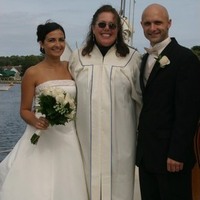The trend these days seems to be delaying selection of the officiant until very late in the wedding planning process. This is puzzling, as the union cannot be solemnified unless an officiant is present. The celebrant should actually be one of the very first people you hire. I recommend you do so with great care and consideration. I urge couples to first retain their officiant, next reserve the venue, and then proceed from there.
Perhaps since so many weddings are performed secularly these days, people often do not know how to interview, hire and relate to their wedding officiant. Simply put, he or she should be treated the same way you would a member of the professional clergy. I was brought up with the old adage "manners can be fun" and with that in mind, ask you to consider inviting your officiant to both the rehearsal dinner and the reception. Your celebrant may not always be able to accept, but the offer is a nice courtesy and if desired, he or she can offer a short blessing or invocation at the beginning of the meal or festivities.
Traditional etiquette dictates that a formal invitation be sent to the officiant, including an invitation to dinners and receptions, but verbal requests are acceptable. Invitations indicate courtesy and eliminate awkward situations and schedule conflicts. Please do not simply expect an officiant to stay after the ceremony without expressing your expectations prior to your wedding day. Many times the officiant will either politely decline or stay for a short time for a "cocktail hour" and decline the full meal at a formal reception. Personally, I appreciate the rehearsal dinner for the opportunity to "bond" with the families. I generally simply stay for the cocktail hour at receptions and then I'm on my way, though it is nice to have the option to stay longer.
If you do want your officiant to be part of the reception and the officiant has accepted the invitation, try to seat the officiant with like minded people. Throughout the wedding planning process, hopefully you will have formed a relationship with your officiant and have an idea what kind of person he or she is. I am a gregarious person and am most comfortable socializing with the same. If your officiant is quiet and retiring, it is probably not a good thing to place him or her at a table with ten of your loudest or most outgoing friends.
If you feel your officiant has done an exceptional job, by all means express yourself with a gratuity. Officiants probably charge the least of all the wedding vendors but who most pour their hearts and souls into the ceremony. We do not just do it as a job; it is a calling and an experience. If the ceremony is particularly pleasing, gratuities are a concrete way to let your officiant know you appreciate what they did and honor their contribution to making the day especially meaningful.

Voted #1 Wedding Officiant since 2007 by The Knot, Wedding Wire, along with Bride, Connecticut Bride and Modern Bride magazines, Marie Tyler Wiley, a non denominational Minister & CT JP will make sure your day is full of joy, fun and laughter! Mystic, CT, is indeed, as Julia Robert's break out movie (Mystic Pizza) suggest "A Little Slice of Heaven" Mystic R-O-C-K-S! We have what it takes to make your dreams come true! Check out my website.
